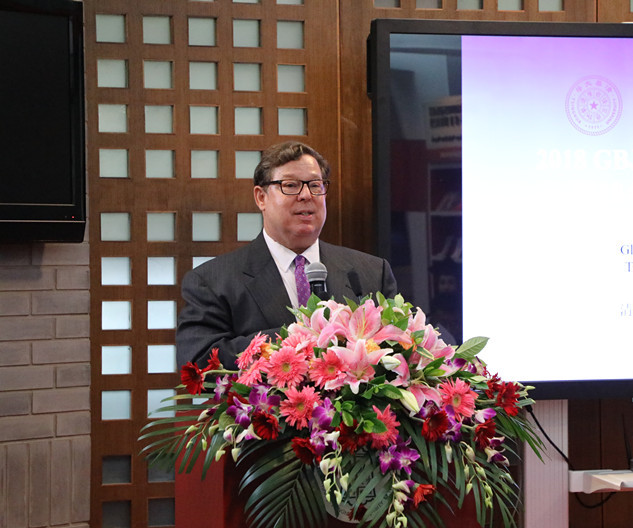
Commencement Address by Rick Dunham for the GBJ Class of 2018
大家好。Добрый день.
Dean Chen. Dean Hu. Dean Shi. Dean Hang. John Liu. Distinguished faculty. And most important, our 2018 graduates. Welcome.
I am honored, on behalf of the International Center for Journalists and the international faculty of the Global Business Journalism Program, to congratulate all of you on your successful completion of your studies.
This special group includes some of the best young journalists in China, along with a diverse mixture of nations: Japan, Russia, Australia, Malaysia, Singapore, Thailand, Korea, Pakistan, Burundi, Azerbaijan, New Zealand, and the United States. Some of you already have made a mark on the world of business journalism during your Tsinghua years. I have great confidence that even more of you will have an impact in the years to come.
Since 2007, the Global Business Journalism program has improved the quality of journalism – and public understanding of business and economic issues – in China and around the world. You have benefited from cross-cultural learning, practical journalism training, and a varied curriculum featuring both Chinese and international professors at one of the world’s great universities.
In the GBJ program, about three-fourths of our students are women, and with rare exceptions, women are the top performers in our program. Yet many of these high achievers may face obstacles in the job market. Women suffer discrimination, overt and hidden, in hiring, promotion and pay. In many countries, it is acceptable to deny jobs or promotions to women because the employer fears they will become wives and mothers, and will not be as committed to their day jobs as men.
Subtle forms of discrimination continue to subvert women’s empowerment even in so-called progressive countries. A recent study of Twitter use by American political reporters found that of the 25 reporters who received the most social media replies from male political reporters in the United States, zero were women. And whose posts did male reporters share? Only three of the 25 most frequently shared reporters were women. It’s no surprise that the vast majority of “experts” quoted by male reporters tend to be male. It’s time for change.
Joyce Barnathan, president of the International Center for Journalists, was one of 10 prominent media leaders who last month proposed 14 steps to combat industry sexism. “It’s time to stop talking about the need for equality and start actively reforming the industry,” Joyce and the other leaders wrote.
We must overcome these insidious forms of male discrimination. In the words of the American civil rights anthem of the 1960s, “we shall overcome, some day.”
My grandfather, Barrows Dunham, a philosopher, author and professor, wrote a book in 1947 entitled “Man Against Myth.” It analyzed social myths that powerful forces employ to maintain their power.
But a feminist author, Betty Millard, was unimpressed by the title, “Man Against Myth,” and produced her own tract in response: “Woman Against Myth.” She decried the cultural and religious customs cited to subjugate women around the world.
As Millard noted, Confucius wrote many centuries ago: “It is a law of nature that women should be kept under the control of men and not allowed any will of their own.” Confucius, without doubt, was a great man. But he was not always right.
Sadly, Millard’s analysis is still relevant today. A GBJ student, in his thesis this year, argued that Islamic feminists believe that “women’s struggle for equality with men is doomed to fail, as women are placed in ‘unnatural settings’ where they are denigrated and burdened with paid work on top of domestic labor.”
I believe in academic freedom, but I do not agree with the sentiments expressed in this quotation.
Fortunately, the Tsinghua School of Journalism and Communication is leading the way in empowering women. Our executive dean, Dr. Chen Changfeng, is a brilliant scholar and inspirational leader. Our associate dean for international affairs, my friend and GBJ co-director Dr. Hang Min, has earned a global reputation for media management and cross-cultural partnerships. Doctors Fan Hong and Dai Jia are popular GBJ professors, and Li Laoshi, Rose Li, is our indispensable international administrator. And more than half of the keynote speakers at our annual Tsinghua Business Journalism Forums have been women.
You see, women can achieve, if given the opportunity and freed of institutional and societal constraints. I hope that all of you in the graduating class of 2018 take inspiration from the accomplishments of your professors and your peers. It is sometimes harder for women to succeed in journalism. That’s the reality. Men still run most news organizations, and men make most of the hiring decisions. But through persistence and sheer excellence, women are gaining ground. I hope to live long enough to see some of you lead the journalistic, economic and even political worlds of the 21st century.
I close by quoting my favorite philosopher, my grandfather, Barrows Dunham. During a lecture in Massachusetts, he expressed optimism about the battle for social progress. “Even now,” he said, “we ourselves are determining the future, not by knowing what it will be, but by conceiving of what it can be.”
I look forward to you determining the future and changing our world. I will cherish your future achievements, unfettered by ancient superstitions and prejudices. Please stay in touch.
谢谢, 大家。Большое спасибо. Thank you.

